|
We carry out the following tasks in this
department:
Research at the service of responsible and competitive
fishing
Responsible exploitation of marine living resources is
the key to ensuring a sustained future for the fishing sector.
Our investigations serve to contribute to the laying down of
those technical bases necessary for the optimum management of
fisheries. We are also working on the transference of new technology
to the fleets to increase their competitiveness.
Therefore, our commitment is
to respond to both the management needs of public administrations
and the competitiveness of the fishing sector.
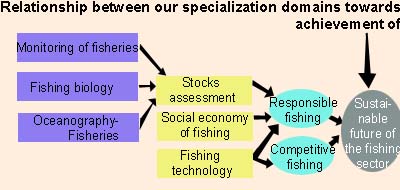 In view of a correct
assessment of stock or resources, we need to monitor the state
of their fisheries, and improve the biological knowledge of the
species and their environment. In view of a correct
assessment of stock or resources, we need to monitor the state
of their fisheries, and improve the biological knowledge of the
species and their environment.
In order to attain responsible
and competitive fishing, it is necessary to know the state of
the stocks and assess its socio-economic implications, as well
as to develop technical bases for continued improvement of the
fishing technology to be employed.
|
Our areas of
specialization and technology expertise are: |
MONITORING OF
FISHERIES
Our task is to obtain
samples and constantly updated information regarding: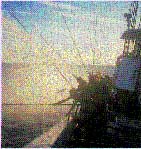
- Structure and activity of the
fleets
- Commercial catches plus their
characteristics
(specialised fishing statistics) |
Basic statistics for the improvement
of the Scientific Management Board
Obtaining basic data on fishing
industries is becoming more important as each day passes at local
and European levels, due to the increasing needs of information
for the correct management of the different fishing industries.
Proof of this, is the notable increase in funds destined by the
EU to the improvement of sampling and information networks together
with the maintenance of the same, by means of different research
projects.
In this sense, this area of activity
enables us to maintain and improve the historical database available
for the study groups of the most important species.
Basque extraction sector in the
different international organisations (ICES, NAFO and ICCAT),
increasing in this manner the active presence of the technicians
from our department of AZTI in the different international work
groups, where the species of interest for the Basque fleet are
studied.
On a parallel to this, we contribute
via this area to the consolidation of the Basque Country’s
own database, thus enabling us to obtain better knowledge of
the traditional local fishing industries, which are not the object
of study by international groups.
Tuna Fisheries
The Basque tuna fisheries
are of great importance. We should like to highlight our active
collaboration with the frozen tuna fish sector in the follow
up to the Atlantic tuna fish protection agreement, commenced
at the end of 1997; likewise in the follow up to the fishing
of tuna fish in the waters of the east Pacific. We have also
advanced in the knowledge of the biology and dynamics of warm
water tuna fish, particularly in relation to white tuna fish.
Pelagic Fisheries
The general objective
of the area is the Follow up of the pelagic fisheries and to
evaluate the state of the anchovy, common mackerel, horse mackerel
and sardine populations, as well as carrying out a scientific
consultancy for the optimum management of the these fisheries
at a European (through CIEM, ACFM), Spanish and Basque Country
level.
Demersal Fisheries in EU waters
Recently, we have increased
the study of these fisheries as well as various projects on distant
fishing waters. The species included in this area are basically
hake, monkfish, of great importance for the Basque fleet, megrim,
cod, and associated species (Norway haddock and Atlantic halibut).
The studies carried out provide
a great advance in the knowledge of biological parameters such
as: age, growth, reproduction, follow up of migrations, etc.
They require a great sampling effort, with the active participation
of the shipowners, together with the execution of numerous fishing
campaigns.
Demersal Fisheries in Distant
Fishing Waters
The study projects on demersal fisheries in distant fishing waters
have increased over the last two years. The main Basque demersal
fishing fleet in distant fishing waters is the cod fishing fleet,
currently made up of 4 pairs based in Pasaia, which fish mainly
cod, black halibut and species associated to both of them, such
as haddock/rubberlip grunt, Norway haddock/redfish, plaice as
well as other flatfish and rock grenadiers/hook noses.
FISHING BIOLOGY
|
We assess the biological parameters,
which describe the dynamics of the populations:
- Migrations
- Stock identity.
- Distribution.
- Growth.
- Reproduction.
- Mortality.
|
ASSESSMENT
OF RESOURCES
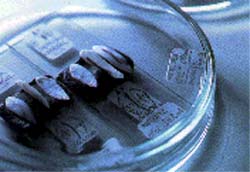 We
participate and promote the following activities: We
participate and promote the following activities:
wEvaluation of the state of the resources.
wEstimation of the abundance and evolution
of resources through direct campaigns.
wExploration of potential new fisheries.
|
Age determination
means of otolith |
|
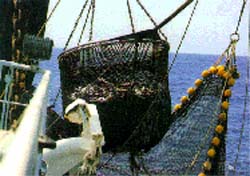 Direct
survey for stock estimation Direct
survey for stock estimation
|
FISHING TECHNOLOGY
We develop and transfer technology
aimed at improving the efficiency of fishing activities regarding:
4Fishing
gear and tackle
4Fishing
vessels
4Detection
and attraction methods (satellite tele-detection, submarine sounding...)
4Behaviour
of species in relation to fishing and tackle |
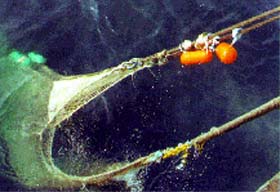 We lay down the
technical bases as a back up for responsible fishing management: We lay down the
technical bases as a back up for responsible fishing management:
-Impact of fishing gear.
-Interaction of different fishing
methods.
Fishing Technology
Orientated towards the
Management of Fishing Resources
This area carries
out research related to the way in which fishing skills work,
one of the main study fields being the selectivity of fishing
skills. Selectivity is defined as the aptitude of a fishing skill
of capturing to a different extent certain sizes of fish in relation
to others within the same species (intra-specific selectivity),
or certain species in relation to others (inter-specific selectivity).
In order to carry out the research,
AZTI has specialised technical personnel at its disposal for
the experimental work at sea, as well as for the process and
analysis of the data gathered from these tests. Among its main
elements, the technical equipment for executing these studies
is made up of experimental fishing skills plus electronic equipment
(SCANMAR) for the follow up of the behaviour of the trawler nets
during fishing.
Orientated towards the
Improvement of Competitiveness
This area which was
started up in 1997, has as its objective the execution of projects
for the improvement of technologies applied to fishing. During
that year, it found itself in the position of having to carry
out a diagnosis of the technology needs of the Basque Fishing
Sector. The Basque fishing sector is made up of inshore fishing,
deep sea fishing, cod fishing, frozen tuna fishing and frozen
trawler fishing fleets, which do not share either the same problems
or the same strategies; since whilst some are concerned about
the stocks of its main species and accessories, others are concerned
about negotiations with third party countries with a view to
the exploitation of their fishing grounds.
RELATION OCEANOGRAPHY-FISHERIES
(ECOLOGY)
Multidisciplinary area conducted,
in collaboration with our departments of Oceanography and Fishing
Resources.
aStudy
on the relationship between environment (blooms, nutrient balances,
chlorophyll, plankton, etc.) and fisheries (distributions, growth,
mortality...).
aStudy on the impact of extraction activities on
the ecosystem.
aStudy on tele-detection applied in fisheries and
the marine environment.
aStudy on the socio-economic consequences of fish
resources management. |
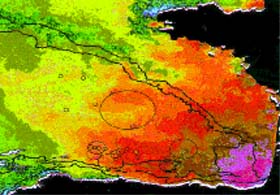 Oceanography – Fisheries (Ecology) Oceanography – Fisheries (Ecology)
Environmental information
for the comprehension of the variations of fishing resources.
AZTI has participated in various international projects which
has enabled them to advance in the comprehension of environmental
relationships and their influence on fishing resources, with
notable achievements obtained with regard to:
- Development and calibration
of ocean current models linked to the continental bank (European
bank current).
- Distribution of hake and anchovy
roe and larvae, and their relation with the ocean currents that
transport them to the breeding grounds.
- Hydrographic study of the Basque
coast in relation to the apparition of the cliff current.
- Follow up by satellite of the
variations in the temperature distribution of the sea surface
over the years of study and their possible influence on the oceanography
and fisheries studied.
SOCIAL ECONOMY
OF FISHING
- We study the socio-economic
consequences of fishery management.
Fish Resources
Department of AZTI | 
